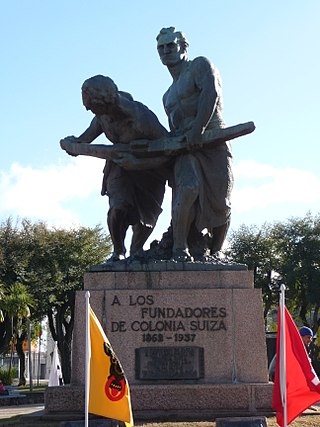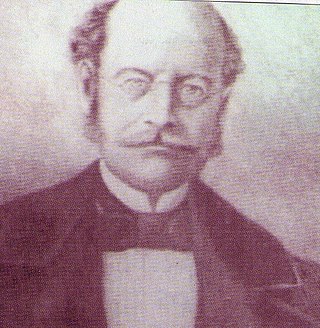
Montevideo is the capital and largest city of Uruguay. According to the 2011 census, the city proper has a population of 1,319,108 in an area of 201 square kilometers (78 sq mi). Montevideo is situated on the southern coast of the country, on the northeastern bank of the Río de la Plata.

Greek Uruguayans are Uruguayan residents either fully or partially of Greek descent or Greece-born people who reside in Uruguay.

Italian Uruguayans are Uruguayan-born citizens who are fully or partially of Italian descent, whose ancestors were Italians who emigrated to Uruguay during the Italian diaspora, or Italian-born people in Uruguay. Outside of Italy, Uruguay has one of the highest percentages of Italians in the world. It is estimated that about 44% of the total population of Uruguay are of Italian descent, corresponding to about 1,500,000 people, while there were around 90,000 Italian citizens in Uruguay.

Paraguay and Uruguay established diplomatic relations on April 6, 1845. Paraguay has an embassy and a consulate-general in Montevideo. Uruguay has an embassy and a consulate-general in Asunción. Paraguay also has an honorary consulate in Punta del Este. Both countries were founding members of the Mercosur, and both are full members of the Rio Group, the Latin Union, the Association of Spanish Language Academies, the Organization of American States, the Organization of Ibero-American States, the Union of South American Nations, the URUPABOL, the Cairns Group and the Group of 77.

There are about 53,000 to 75,000 Lebanese Uruguayans, or Uruguayans of Lebanese origin. The Lebanese are one of the larger non-European communities, though still not as large a group as most European groups. Relations between Uruguay and Lebanon have always been close.

The history of the Jews in Uruguay dates back to the colonial empire. The most important influx of Jewish population occurred during the end of the 19th century and the first half of the 20th century, mainly during the World War II.

The German community in Uruguay numbers ca. 10,000 German expatriates and 40,000 people of German descent. Most of them live in the Montevideo area, although there are German minorities in Paysandú, Río Negro, San José and Canelones.

British Uruguayans are British nationals residing permanently in Uruguay or Uruguayan citizens claiming British heritage. Unlike other waves of immigration to Uruguay from Europe, British immigration to Uruguay has historically been small, especially when compared to the influxes of Spanish and Italian immigrants. Like their counterparts in Argentina, British immigrants tended to be skilled workers, ranchers, businessmen and bureaucrats rather than those escaping poverty in their homeland.
Chinese Uruguayans are Uruguayan citizens of Chinese ancestry or are Chinese people residing in Uruguay.
Peruvian Uruguayans are mostly Peruvian-born persons living in Uruguay. There are as well some Uruguayan-born persons of partially or full Peruvian descent.

Immigration to Uruguay began in several millennia BCE with the arrival of different populations from Asia to the Americas through Beringia, according to the most accepted theories, and were slowly populating the Americas. The most recent waves of immigrants started with the arrival of Spaniards in the 16th century, during the colonial period, to what was then known as the Banda Oriental.

Brazilian Uruguayans are people born in Brazil who live in Uruguay, or Uruguayan-born people of Brazilian descent.
Uruguayans in Sweden are people born in Uruguay who live in Sweden, or Swedish-born people of Uruguayan descent. As of 2013, there were over 4,000 Uruguayans living in Swedish territory.

Uruguayan Mexicans are people born in Uruguay who live in Mexico, or Mexico-born people of Uruguayan descent.

A Polish Uruguayan is a Uruguayan citizen of full or partial Polish ancestry.

Russian Uruguayans are people born in Russia who live in Uruguay or Uruguay-born people of Russian descent. They are a local ethnic minority.

Swiss Uruguayans are Uruguayan citizens of full or partial Swiss ancestry, who remain culturally connected to Switzerland, or Swiss-born people permanently residing in Uruguay. They are estimated to be around 60,000.
Zoma Baitler was a Jewish Lithuanian-born Uruguayan artist and diplomat.

Hungarian Uruguayans are people born in Hungary who live in Uruguay or Uruguayan-born people of Hungarian descent.
Austrian Uruguayans are people born in Austria who live in Uruguay or Uruguayan-born people of Austrian descent.















